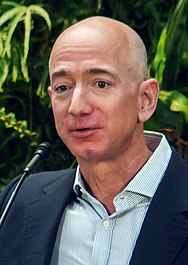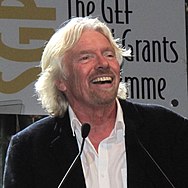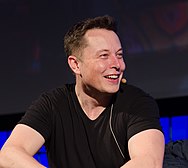Billionaire space race
The billionaire space race[2][3][4][5] is the rivalry among entrepreneurs who have entered the space industry from other industries - particularly computing.[6][7] This private spaceflight race involves sending privately developed rockets and vehicles to various destinations in space, often in response to government programs or to develop the space tourism sector.[8]
Since 2018 the billionaire space race has primarily been between three billionaires and their respective firms:
- Jeff Bezos's Blue Origin, which is seeking to establish an industrial base in space.[5][3][1]
- Elon Musk's SpaceX, which seeks to colonize Mars as well as provide satellite-based internet through its Starlink project.[5][1]
Prior to his death in 2018,
Background
The groundwork for the billionaire space race and
Government programs have also fuelled the billionaire space race. NASA programs such as the
Major milestones
- 21 June 2004 – Scaled Composites Tier One, funded by Paul Allen, achieves the first entirely privately funded crewed flight to space (suborbital, crossing the 100 km Kármán line) with the SpaceShipOne flight 15P. The program won the Ansari X Prize later that year.
- 30 May 2020 – SpaceX successfully launches a Falcon 9 rocket carrying the Crew Dragon space capsule during the Demo-2 mission, marking the first privately-developed crewed mission to orbit and to visit the ISS.
- 11 July 2021 – Richard Branson made a successful sub-orbital spaceflight as member of the Virgin Galactic Unity 22.[13]
- 20 July 2021 – Jeff Bezos also made a successful sub-orbital spaceflight aboard Blue Origin's NS-16, becoming the first billionaire space company founder to cross the Karman Line.[14]
- 16 September 2021 – SpaceX operates the Inspiration4 mission, the first orbital spaceflight with only private citizens aboard.[15]
- April 2023 - On its inaugural flight, Starship becomes the most powerful launch vehicle ever flown.[16]
- May 2024 - Boosters (1st stage) of the Falcon 9 family of rockets have been reused over 300 times. Certification is in progress to be able to reuse a single booster 40 times.[17]
- Q4 2024 - Expected first launch of New Glenn, Blue Origin’s heavy lift reusable launcher contracted for the Artemis program and other planetary missions.[18]
Rivalries
| Part of a series on |
| Private spaceflight |
|---|
 |
| Active companies |
| Active vehicles |
| Contracts and programs |
|
| Related |
SpaceX vs. Blue Origin
SpaceX and Blue Origin have had a long history of conflict.[5][7] Blue Origin and SpaceX have had dueling press releases that compete with each other's announcements and events.[19][20]
SpaceX and Blue Origin battled for the right to lease
SpaceX filed suit against Blue Origin to invalidate their patent on landing rockets aboard ships at sea. They won their court fight in 2014. SpaceX had been attempting to land rockets at sea since 2014, finally succeeding in 2016, before Blue Origin first built a sea-going platform for landing rockets.[7]
SpaceX and Blue Origin got into a Twitter battle about the meaning of a used rocket, landed rocket, spacerocket, at the end of 2015, when
In late 2016, Blue Origin announced the New Glenn, directly competing against SpaceX's Falcon Heavy, with a larger rocket but lower payload.[22]
At the 2016
In April 2021,
Blue Origin vs. Virgin Galactic
In May of 2023 Richard Branson ended Virgin Orbit in bankruptcy, and then in December of 2023 he announced that he won't invest any more money in Virgin Galactic, having already put one billion dollars into the project, he said that they should have enough money to continue without any more from him.[30]
Former rivalries

Stratolaunch vs. Virgin Orbit
The Stratolaunch rivalries are no longer part of the billionaire space race, after 2019, having been suspended at the time of Paul Allen's death.[9][31] The Stratolaunch company has since continued operations under new ownership, but does not focus on orbital space launches anymore.
Criticism
The critical response to space tourism has lambasted billionaire founders (e.g., Richard Branson and Jeff Bezos), downplayed their achievement, and questioned their environmental, financial, and social/ethical practices. This discursive contention is sharply opposed to dominant narratives which typically frame space tourism as a net positive for humankind.[33]
See also
- The Space Barons, 2018 book by Christian Davenport
- Cold War Space Race; between the US and USSR; leading to the Race to the Moon
- Space launch market competition
- Commercialization of space
- Mars race
- List of billionaire spacetravellers
References
- ^ a b c d e Polina Marinova (15 November 2016). "What Billionaire Richard Branson Thinks of Jeff Bezos and Elon Musk". Fortune. Time. Archived from the original on 26 February 2019. Retrieved 17 November 2016.
- .
- ^ a b c d Clive Irving (19 June 2016). "Jeff Bezos Ready to Beat Richard Branson in the Billionaire Space Race". The Daily Beast. Archived from the original on 25 September 2016. Retrieved 24 September 2016.
- ^ a b Robert Lafranco (13 April 2015). "Allen and Branson Best Musk as the Billionaire Space Race Takes Off". Bloomberg. Archived from the original on 2019-04-28. Retrieved 2017-08-24.
- ^ a b c d e f Charles W. Luzier (17 September 2016). "The great billionaire space race". The Week. Reuters. Archived from the original on 28 April 2019. Retrieved 24 September 2016.
- ^ Matthew Lynn (May 2016). "Watch this space: why billionaires are launching extraterrestrial adventures". The Spectator. Archived from the original on 2018-06-14.
- ^ a b c d e Christian Davenport (19 August 2016). "The inside story of how billionaires are racing to take you to outer space". Washington Post. Archived from the original on 19 November 2016. Retrieved 24 September 2016.
- ^ ISBN 978-1594206726.
- ^ a b c Benjamin Romano; Katherine Anne Long; Brendan Kiley (26 November 2019). "What's happening to Paul Allen's billions? A year after his death, it's complicated". The Seattle Times. Archived from the original on 4 June 2023. Retrieved 18 September 2021.
- ^ Vivek Wadhwa (19 September 2016). "The renegade whose dream started the latest space race". Washington Post. Archived from the original on 19 November 2016. Retrieved 24 September 2016.
- ^ Alan Yuhas (9 February 2018). "The new space race: how billionaires launched the next era of exploration". The Guardian. Archived from the original on 31 March 2018. Retrieved 1 April 2018.
- ^ Ben-Itzhak, Svetla (January 11, 2022). "Companies are commercializing outer space. Do government programs still matter?". The Washington Post. Archived from the original on April 21, 2023. Retrieved July 1, 2023.
- ^ Jackie Wattles (11 July 2021). "Virgin Galactic founder Richard Branson successfully rockets to outer space". CNN. Archived from the original on 2022-11-13. Retrieved 2021-07-20.
- from the original on 2021-07-21. Retrieved 2021-07-20.
- ^ "Inspiration4: Why SpaceX's first all-private mission is a big deal". 2021-09-15. Retrieved 2024-05-11.
- ^ emmalouisebackeanthro (2023-04-20). "SpaceX's biggest rocket flies for the first time: But Do We Understand What This Actually Means?". The Geek Anthropologist. Retrieved 2024-05-11.
- ^ "SpaceX completes 300th Falcon booster landing during Starlink mission – Spaceflight Now". Retrieved 2024-05-11.
- ^ Foust, Jeff (2024-04-25). "NASA planning September launch of Mars smallsat mission on first New Glenn". SpaceNews. Retrieved 2024-05-11.
- ^ Dana Hull (8 March 2017). "SpaceX Will Launch Its First Reused Rocket Later This Month". Bloomberg. Archived from the original on 2017-04-05. Retrieved 2017-04-05.
- ^ Rae Paoletta (31 March 2017). "Is Blue Origin's Tourist Capsule Sexier Than SpaceX's?". Gizmodo. Archived from the original on 4 September 2017. Retrieved 9 September 2017.
- ^ Bezos, Jeff [@JeffBezos] (December 22, 2015). "Congrats @SpaceX on landing Falcon's suborbital booster stage. Welcome to the club!" (Tweet). Archived from the original on 2021-09-10. Retrieved 2021-09-11 – via Twitter.
- ^ Eric Mack (12 September 2016). "Jeff Bezos' Blue Origin to take on SpaceX with supersized rocket New Glenn". cNet news. Archived from the original on 14 September 2016. Retrieved 25 September 2016.
- ^ Alan Boyle (27 September 2016). "Jeff Bezos' Blue Origin space venture sets its sights on trips to Mars and the moon". GeekWire. Archived from the original on 28 September 2016. Retrieved 29 September 2016.
- ^ Brown, Katherine (2021-04-16). "NASA Picks SpaceX to Land Next Americans on Moon". NASA (Press release). Archived from the original on 2021-04-22. Retrieved 2021-05-02.
- ^ Sheetz, Michael (2021-11-04). "Bezos' Blue Origin loses NASA lawsuit over SpaceX $2.9 billion lunar lander contract". CNBC. Archived from the original on 2022-01-04. Retrieved 2023-05-21.
- ^ "NASA Selects Blue Origin as Second Artemis Lunar Lander Provider". Archived from the original on 2023-05-19. Retrieved 2023-05-19.
- ^ "Bezos' Blue Origin wins NASA astronaut moon lander contract to compete with SpaceX's Starship". CNBC. 19 May 2023. Archived from the original on 19 May 2023. Retrieved May 19, 2023.
- ^ Josh Hrala (4 August 2016). "Virgin Galactic is finally licensed to take tourists into space". Science Alert. Archived from the original on 20 September 2016. Retrieved 24 September 2016.
- ^ Jackie Wattles (20 June 2016). "Blue Origin successfully crash tests space-tourism capsule". CNN Money. Archived from the original on 8 November 2020. Retrieved 3 August 2020.
- ^ Steve Symington (23 December 2023). "No More Cash From Richard Branson: Is This The End For Virgin Galactic?". The Motley Fool. Archived from the original on 8 January 2024. Retrieved 8 January 2024.
- ^ Stephen Clark (11 October 2019). "Stratolaunch under new ownership". Spaceflight Now. Archived from the original on 18 September 2021. Retrieved 18 September 2021.
- ^ Max Lewontin (20 June 2016). "Paul Allen vs. Elon Musk: a different approach to satellite launches". Christian Science Monitor. Archived from the original on 28 September 2016. Retrieved 25 September 2016.
- .
Further reading
- Bernstein, Joshua D. (May 2024). "The billionaire space race: Internet memes and the netizen response to space tourism". Annals of Tourism Research Empirical Insights. 5 (1): 100122. .
- Christian Davenport (2018). ISBN 978-1610398299.
- Tim Fernholz (2018). Rocket Billionaires: Elon Musk, Jeff Bezos, and the New Space Race. Houghton Mifflin Harcourt. ISBN 978-1328662231.
- Julian Guthrie (2016). ISBN 978-1594206726.
- ISBN 978-0062301239.



